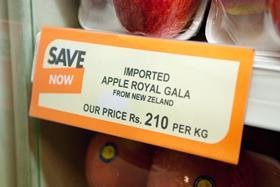
The Indian government has announced proposed changes to its plant quarantine laws that would effectively halt the country’s burgeoning trade in imported apples.
The draft amendments, outlined in a notification from the Indian Department of Agriculture and Cooperation, add a number of pests for each apple and pear supplying origin that the respective exporting countries must certify are not present in shipments.
The conditions causing greatest concern to the apple trade, however, are requirements for imports to be fumigated with methyl bromide at 21oC for two hours and to undergo cold treatment prior to shipment. Such measures, which would apply to all apple supplying countries with access to India, would effectively render shipments commercially unviable and shut down the market.
Representatives of key apple supplying nations told Asiafruit it was too risky to subject fruit to methyl bromide fumigation at 21oC for two hours, particularly given the lack of cold chain on arrival in India. “Our fruit would be highly susceptible `to damage` with a 30-40 day transit time,” said one Washington State apple industry source. “This is a non-starter – it’d be like cooking the fruit.”
India is a key emerging market for global apple suppliers, with imports more than doubling between 2006/07 and 2009/10 to reach almost 100,000 tonnes. The US and China account for the lion’s share of volumes, while Chile and New Zealand are also key suppliers during the Southern Hemisphere season.
Washington apple shipments to India hit a record 3.3m cartons in 2010/11, pushing this up-and-coming export market into third spot for the industry behind Mexico and Canada. With the 2011/12 Washington export campaign moving towards its peak, shippers are anxious about the proposed changes.
“We’re very concerned about the proposed plant quarantine changes related to apples and pears,” said Mark Powers of the Northwest Horticultural Council, which focuses on resolving policy issues for growers and shippers in the Pacific Northwest. “We’re working with the USDA to seek clarification regarding the requirements, to better understand what they’re asking, and to seek changes.”
The proposed regulations are open for comment until 10 March, and all countries exporting apples to India are likely to oppose the measures, which are due to take effect on 31 March if approved.
Powers said the Northwest Horticultural Council would be seeking immediate clarification on the regulations. “We’ll be trying to get some answers sooner rather than later, and some understanding to convey to the trade, so there is some certainty there,” he said. “If you’re a shipper trying to line up business, you need that. We hope to get some answers this week.”
Of particular concern to the US apple industry is the move by Indian authorities to list Mediterranean fruit fly (Medfly) as a pest concern for shipments from that country. “We’ve never had Medfly – the US is free from it, and India used to recognise this, so we hope that it was an inadvertent omission,” said Powers. “Our initial main concern is the need `for India` to abide by international plant health standards that recognise the US is free of Medfly.”
A failure to recognise international plant protection convention would put India in breach of WTO laws. Indeed, key figures in the New Zealand apple industry, which saw its exports to India almost double last year to reach 650,000 cartons, feel the proposed changes do not comply with WTO requirements.
“The New Zealand view is that India is in breach of its WTO obligation under the SPS agreement in that it is trying to apply a measure that is more trade restrictive than is necessary to meet its appropriate level of protection,” said Peter Beaven, CEO of Pipfruit New Zealand. “In 12 years of trading with India, we have not been notified of a single actionable interception, so any change that further restricts access could not be justified.”
Beaven said the uncertainty caused by the Indian government’s announcement was problematic for New Zealand apple shippers as they gear up for their 2012 season. “Under these proposed changes, our industry can’t really send any apples from late February because they will arrive after 31 March and we won’t know what the rules will be by then,” said Beaven. “This stands to create a hole in the Southern Hemisphere apple import supply into India.”
With New Zealand and India in the advanced stages of negotiating a free trade agreement (FTA), the proposed laws could present a significant setback, and New Zealand pipfruit industry officials said their government would be urging India to reconsider its proposed changes.



